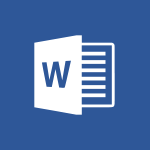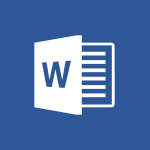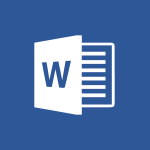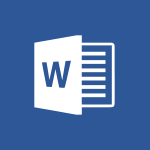Word - Introduction to Tables of Contents Video
In this video, you will learn about the Introduction to Tables of Contents.
The video covers how to add a Table of Contents to a document using automatic Tables of Contents.
It explains how to add headings with heading styles, insert an automatic Table of Contents, and update it automatically.
The video also demonstrates how to customize the Table of Contents and make it work for print or the web.
This will help you create professional-looking documents with easily navigable Table of Contents.
- 2:57
- 3084 views
-
Word - 3D Models
- 0:42
- Viewed 2928 times
-
Word - Introduction to Tables of Contents
- 2:57
- Viewed 3084 times
-
Word - Take tables of contents (TOCs) to the next level
- 3:51
- Viewed 2932 times
-
Outlook - Recall or replace an e-mail you sent
- 1:25
- Viewed 3550 times
-
Word - Working with watermarks
- 2:48
- Viewed 2145 times
-
Word - A closer look at the ribbon
- 3:54
- Viewed 2595 times
-
Excel - How to simultaneously edit and calculate formulas across multiple worksheets
- 3:07
- Viewed 3940 times
-
Excel - How to use 3-D reference or tridimensional formulas
- 3:01
- Viewed 3404 times
-
Collapsible headings
- 3:03
- Viewed 6685 times
-
Navigation Pane Part 1 : Rearranging a document
- 2:32
- Viewed 3851 times
-
Copy & Paste
- 3:09
- Viewed 3614 times
-
Introduction to Word
- 0:59
- Viewed 3505 times
-
More things you can do with pictures
- 4:53
- Viewed 3205 times
-
Change footnote font, size, and formatting
- 2:48
- Viewed 3189 times
-
Insert icons
- 0:43
- Viewed 3145 times
-
Locate your documents
- 0:20
- Viewed 3126 times
-
Microsoft Search
- 0:34
- Viewed 3094 times
-
More options and custom labels
- 3:59
- Viewed 3062 times
-
Insights into what you're working on
- 0:36
- Viewed 2978 times
-
Use dictate to type in Word
- 0:27
- Viewed 2971 times
-
Faster shape formatting and new and modern chart types
- 1:04
- Viewed 2943 times
-
Mail merge
- 3:51
- Viewed 2935 times
-
Take tables of contents (TOCs) to the next level
- 3:51
- Viewed 2932 times
-
3D Models
- 0:42
- Viewed 2928 times
-
Add a logo or other picture
- 3:17
- Viewed 2912 times
-
Format a document
- 2:58
- Viewed 2895 times
-
Translate Content in Word
- 2:04
- Viewed 2895 times
-
Format and add a graphic
- 3:20
- Viewed 2876 times
-
Save, export and share
- 2:08
- Viewed 2831 times
-
Insert items in a document
- 2:59
- Viewed 2825 times
-
Translate your Word documents into any language
- 0:33
- Viewed 2818 times
-
Let Word read your documents out loud
- 0:36
- Viewed 2813 times
-
Ink Equation
- 0:43
- Viewed 2782 times
-
Edit document with natural gestures
- 0:34
- Viewed 2778 times
-
A first look at Word 2016
- 3:16
- Viewed 2738 times
-
Print envelopes with mail merge
- 3:58
- Viewed 2736 times
-
Track changes online
- 3:14
- Viewed 2736 times
-
Design considerations for orientation
- 2:00
- Viewed 2720 times
-
Add headers, footers, margins, and rulers to a page
- 2:45
- Viewed 2703 times
-
Accessibility in Word
- 2:29
- Viewed 2696 times
-
Insert and customize a footnote
- 3:04
- Viewed 2689 times
-
How things are organized
- 2:00
- Viewed 2676 times
-
Check Accessibility in Word
- 1:42
- Viewed 2657 times
-
Navigation Pane Part 2 : Search Options
- 1:35
- Viewed 2628 times
-
Use landscape and portrait orientation
- 3:28
- Viewed 2620 times
-
Custom margin - Headers and footers
- 1:29
- Viewed 2607 times
-
A closer look at the ribbon
- 3:54
- Viewed 2595 times
-
Track changes in email with multiple people
- 4:36
- Viewed 2593 times
-
Modify a TOC with field codes
- 2:59
- Viewed 2590 times
-
Focus on priorities with the Immersive Reader
- 1:13
- Viewed 2590 times
-
Advanced mail merge (Field code)
- 2:59
- Viewed 2585 times
-
Add multiple TOCs to a document
- 4:59
- Viewed 2555 times
-
Create and print labels
- 3:05
- Viewed 2510 times
-
Chat with co-authors while editing
- 0:29
- Viewed 2503 times
-
Incorporate revisions with track changes
- 3:10
- Viewed 2483 times
-
Pin your important files
- 0:34
- Viewed 2468 times
-
Do things quickly with Tell Me
- 1:04
- Viewed 2425 times
-
Get going fast
- 1:44
- Viewed 2411 times
-
Print letters with mail merge
- 4:02
- Viewed 2405 times
-
Use mail merge to create multiple labels
- 3:21
- Viewed 2393 times
-
Add custom entries to a TOC
- 3:00
- Viewed 2386 times
-
Start working together in a document
- 2:03
- Viewed 2381 times
-
Add formatting to a TOC
- 3:48
- Viewed 2378 times
-
Advanced tables of contents
- 3:15
- Viewed 2346 times
-
Track changes
- 2:34
- Viewed 2346 times
-
Work together in real time
- 1:40
- Viewed 2330 times
-
Customize track changes
- 2:18
- Viewed 2324 times
-
Changing existing styles
- 1:08
- Viewed 2293 times
-
Custom margin - Default margin
- 1:06
- Viewed 2265 times
-
Styles
- 1:49
- Viewed 2261 times
-
Working with watermarks
- 2:48
- Viewed 2145 times
-
Improved version history
- 0:56
- Viewed 2117 times
-
Creating Styles
- 1:03
- Viewed 2111 times
-
Custom margin
- 1:59
- Viewed 2092 times
-
Introducing to Word
- 01:00
- Viewed 165 times
-
Introduction to PowerBI
- 00:60
- Viewed 167 times
-
Introduction to Microsoft Outlook
- 01:09
- Viewed 158 times
-
Introduction to Microsoft Insights
- 02:04
- Viewed 155 times
-
Introduction to Microsoft Viva
- 01:22
- Viewed 161 times
-
Introduction to Planner
- 00:56
- Viewed 169 times
-
Introduction to Microsoft Visio
- 02:07
- Viewed 158 times
-
Introduction to Microsoft Forms
- 00:52
- Viewed 164 times
-
Introducing to Microsoft Designer
- 00:28
- Viewed 224 times
-
Introduction to Sway
- 01:53
- Viewed 142 times
-
Introducing to Word
- 01:00
- Viewed 165 times
-
Introducing to SharePoint Premium
- 00:47
- Viewed 147 times
-
Create a call group
- 01:15
- Viewed 200 times
-
Use call delegation
- 01:07
- Viewed 128 times
-
Assign a delegate for your calls
- 01:08
- Viewed 200 times
-
Ring multiple devices simultaneously
- 01:36
- Viewed 136 times
-
Use the "Do Not Disturb" function for calls
- 01:28
- Viewed 126 times
-
Manage advanced call notifications
- 01:29
- Viewed 141 times
-
Configure audio settings for better sound quality
- 02:08
- Viewed 173 times
-
Block unwanted calls
- 01:24
- Viewed 140 times
-
Disable all call forwarding
- 01:09
- Viewed 141 times
-
Manage a call group in Teams
- 02:01
- Viewed 132 times
-
Update voicemail forwarding settings
- 01:21
- Viewed 130 times
-
Configure call forwarding to internal numbers
- 01:02
- Viewed 123 times
-
Set call forwarding to external numbers
- 01:03
- Viewed 148 times
-
Manage voicemail messages
- 01:55
- Viewed 187 times
-
Access voicemail via mobile and PC
- 02:03
- Viewed 205 times
-
Customize your voicemail greeting
- 02:17
- Viewed 125 times
-
Transfer calls with or without an announcement
- 01:38
- Viewed 121 times
-
Manage simultaneous calls
- 01:52
- Viewed 131 times
-
Support third-party apps during calls
- 01:53
- Viewed 160 times
-
Add participants quickly and securely
- 01:37
- Viewed 132 times
-
Configure call privacy and security settings
- 02:51
- Viewed 130 times
-
Manage calls on hold
- 01:20
- Viewed 137 times
-
Live transcription and generate summaries via AI
- 03:43
- Viewed 126 times
-
Use the interface to make and receive calls
- 01:21
- Viewed 131 times
-
Action Function
- 04:18
- Viewed 139 times
-
Search Function
- 03:42
- Viewed 188 times
-
Date and Time Function
- 02:53
- Viewed 169 times
-
Logical Function
- 03:14
- Viewed 255 times
-
Text Function
- 03:25
- Viewed 200 times
-
Basic Function
- 02:35
- Viewed 158 times
-
Categories of Functions in Power FX
- 01:51
- Viewed 188 times
-
Introduction to Power Fx
- 01:09
- Viewed 159 times
-
The New Calendar
- 03:14
- Viewed 282 times
-
Sections
- 02:34
- Viewed 171 times
-
Customizing Views
- 03:25
- Viewed 166 times
-
Introduction to the New Features of Microsoft Teams
- 00:47
- Viewed 271 times
-
Guide to Using the Microsoft Authenticator App
- 01:47
- Viewed 186 times
-
Turn on Multi-Factor Authentication in the Admin Section
- 02:07
- Viewed 146 times
-
Concept of Multi-Factor Authentication
- 01:51
- Viewed 173 times
-
Retrieve Data from a Web Page and Include it in Excel
- 04:35
- Viewed 392 times
-
Create a Desktop Flow with Power Automate from a Template
- 03:12
- Viewed 334 times
-
Understand the Specifics and Requirements of Desktop Flows
- 02:44
- Viewed 206 times
-
Dropbox: Create a SAS Exchange Between SharePoint and Another Storage Service
- 03:34
- Viewed 349 times
-
Excel: List Files from a Channel in an Excel Workbook with Power Automate
- 04:51
- Viewed 222 times
-
Excel: Link Excel Scripts and Power Automate Flows
- 03:22
- Viewed 228 times
-
SharePoint: Link Microsoft Forms and Lists in a Power Automate Flow
- 04:43
- Viewed 404 times
-
SharePoint: Automate File Movement to an Archive Library
- 05:20
- Viewed 199 times
-
Share Power Automate Flows
- 02:20
- Viewed 193 times
-
Manipulate Dynamic Content with Power FX
- 03:59
- Viewed 197 times
-
Leverage Variables with Power FX in Power Automate
- 03:28
- Viewed 184 times
-
Understand the Concept of Variables and Loops in Power Automate
- 03:55
- Viewed 196 times
-
Add Conditional “Switch” Actions in Power Automate
- 03:58
- Viewed 232 times
-
Add Conditional “IF” Actions in Power Automate
- 03:06
- Viewed 168 times
-
Create an Approval Flow with Power Automate
- 03:10
- Viewed 361 times
-
Create a Scheduled Flow with Power Automate
- 01:29
- Viewed 584 times
-
Create an Instant Flow with Power Automate
- 02:18
- Viewed 338 times
-
Create an Automated Flow with Power Automate
- 03:28
- Viewed 328 times
-
Create a Simple Flow with AI Copilot
- 04:31
- Viewed 306 times
-
Create a Flow Based on a Template with Power Automate
- 03:20
- Viewed 274 times
-
Discover the “Build Space”
- 02:26
- Viewed 192 times
-
The Power Automate Mobile App
- 01:39
- Viewed 200 times
-
Familiarize Yourself with the Different Types of Flows
- 01:37
- Viewed 193 times
-
Understand the Steps to Create a Power Automate Flow
- 01:51
- Viewed 282 times
-
Discover the Power Automate Home Interface
- 02:51
- Viewed 187 times
-
Access Power Automate for the Web
- 01:25
- Viewed 298 times
-
Understand the Benefits of Power Automate
- 01:30
- Viewed 245 times
Objectifs :
This video aims to teach viewers how to create and manage an automatic Table of Contents in a document, highlighting the benefits of using heading styles and the ease of updating the table as changes are made.
Chapitres :
-
Introduction to Automatic Tables of Contents
Creating a Table of Contents manually can be tedious and requires constant updates. This video introduces a more efficient method: using automatic Tables of Contents that update seamlessly as you modify your document. -
Setting Up Headings
To create an automatic Table of Contents, start by adding headings throughout your document. Use heading styles (Heading 1, Heading 2, or Heading 3) to designate sections, chapters, and sub-chapters. For instance, apply Heading 1 for major sections and Heading 2 for chapters. This structured approach allows Word to recognize these headings as entries in the Table of Contents. -
Inserting the Table of Contents
Once your headings are in place, navigate to the References tab in Word. Click on 'Table of Contents' and select your preferred automatic table style. Word will generate a Table of Contents based on the headings you've styled, automatically indenting subheadings for clarity. -
Updating the Table of Contents
As you continue to edit your document—adding sections, moving text, or changing headings—updating the Table of Contents is straightforward. Simply click 'Update Table' and choose to refresh either the page numbers or the entire table, ensuring your Table of Contents remains accurate. -
Customizing Your Table of Contents
For further customization, click on 'Table of Contents' and select 'Custom Table of Contents.' Here, you can adjust settings such as the number of heading levels displayed and how styles are mapped to each level. Additionally, you can tailor the Table of Contents for print or web distribution, allowing readers to navigate via clickable links. -
Conclusion
Using an automatic Table of Contents not only saves time but also enhances the usability of your document. By following the steps outlined in this video, you can create a dynamic Table of Contents that updates with your content, making it easier for readers to navigate your work.
FAQ :
How do I create a Table of Contents in a document?
To create a Table of Contents, first apply heading styles to the sections you want to include. Then, go to the References tab, click on Table of Contents, and select an automatic table style. The software will generate the Table of Contents based on your styled headings.
What are heading levels in a Table of Contents?
Heading levels refer to the hierarchy of headings in your document. Heading 1 is typically used for main sections, Heading 2 for chapters, and Heading 3 for sub-chapters. You can customize how these levels appear in your Table of Contents.
Can I update my Table of Contents after making changes to my document?
Yes, you can easily update your Table of Contents by clicking on 'Update Table' in the References tab. You can choose to update just the page numbers or the entire table to reflect any changes made.
How can I customize my Table of Contents?
To customize your Table of Contents, click on 'Table of Contents' in the References tab and select 'Custom Table of Contents.' From there, you can adjust the number of levels displayed, modify styles, and set options for print or web distribution.
What is the benefit of using an automatic Table of Contents?
An automatic Table of Contents saves time and effort by generating entries based on your document's headings. It also allows for easy updates whenever changes are made, ensuring that the Table of Contents remains accurate.
Quelques cas d'usages :
Creating a Professional Report
When preparing a professional report, using an automatic Table of Contents can help organize the document effectively. By applying heading styles to sections, the report becomes easier to navigate, allowing readers to find information quickly.
Developing a User Manual
In a user manual, an automatic Table of Contents can enhance usability. By categorizing sections with heading styles, users can easily locate instructions and troubleshooting tips, improving their overall experience with the product.
Writing an Academic Thesis
For an academic thesis, a well-structured Table of Contents is essential. By using heading levels to differentiate chapters and sub-chapters, the thesis becomes more accessible, and the automatic update feature ensures that any changes are reflected promptly.
Creating a Web-Based Document
When distributing a document online, an automatic Table of Contents with clickable links allows readers to navigate directly to sections without scrolling. This enhances the user experience and makes the document more interactive.
Preparing a Business Proposal
In a business proposal, a clear Table of Contents helps potential clients navigate the document. By using heading styles to outline key sections, the proposal becomes more professional and easier to review, increasing the chances of approval.
Glossaire :
Table of Contents
A list of the sections and chapters in a document, along with their corresponding page numbers, allowing readers to navigate the document easily.
Heading Style
A predefined format in word processing software that determines the appearance of headings in a document, which can be applied to text to categorize content.
Styles Gallery
A collection of formatting options in word processing software that allows users to apply consistent styles to text, including headings, body text, and more.
References Tab
A section in word processing software where users can find tools related to citations, bibliographies, and the Table of Contents.
Update Table
A function that refreshes the Table of Contents to reflect any changes made in the document, such as added or removed sections.
Custom Table of Contents
An option that allows users to modify the default settings of the Table of Contents, including the number of heading levels displayed and their formatting.



